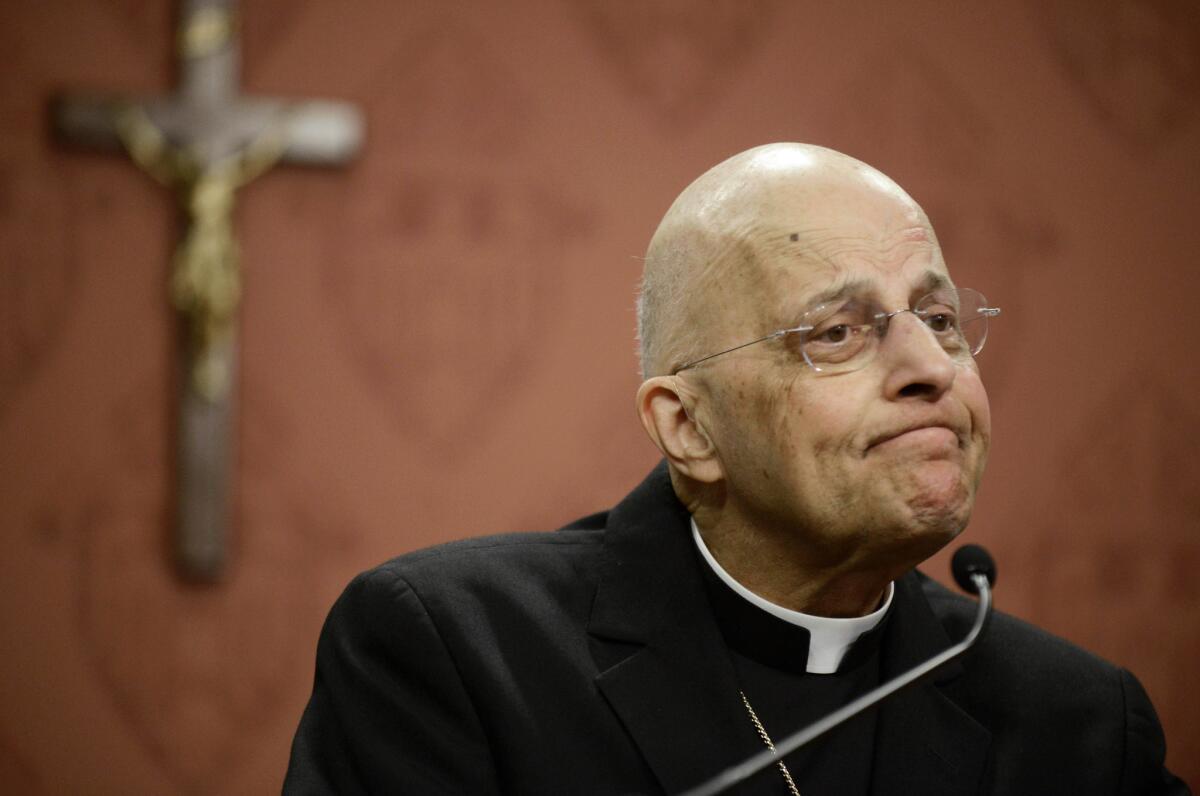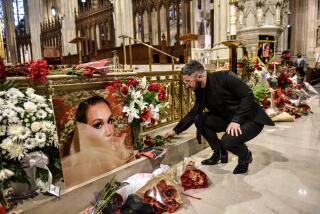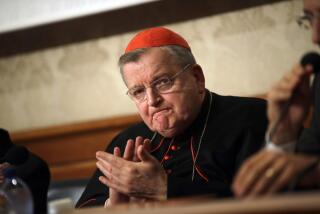Cardinal Francis George dies at 78; head of Chicago Archdiocese

Cardinal Francis George, a vigorous defender of Roman Catholic orthodoxy who led the U.S. bishops’ fight against Obamacare and played a key role in the church’s response to the clergy sex abuse scandal, has died. He was 78.
George, who retired as Chicago archbishop in the fall of 2014, died Friday morning after a long fight with cancer, according to the Archdiocese of Chicago. He announced in December 2014 that doctors had determined their treatment for the cancer found on his kidney had failed.
Appointed to Chicago in 1997 by Pope John Paul II, George became a leading figure of his era in many of the most important events in the American church.
He oversaw the contentious new English-language translation of the Roman Missal, one of the biggest changes in Catholic worship in generations. In 2002, at the height of the abuse crisis, he led a group of U.S. bishops who persuaded resistant Vatican officials that they should more quickly oust guilty priests — a policy at the core of reforms meant to restore trust in church leaders.
And in his three years as president of the U.S. Conference of Catholic Bishops, George led opposition to the Affordable Care Act, arguing that President Obama’s health insurance plan would use taxpayer money for funding abortion. In 2012, Catholic Charities of the Archdiocese of Chicago joined dozens of dioceses and Catholic nonprofits in suing the Obama administration over the requirement that employers provide health insurance that covers contraception.
“I don’t believe the bishops have been more politically active in recent years, but it is true that our political activity is more adversarial as the law no longer permits the exceptions that used to safeguard believers whose conscience will not permit them to approve of what has become lawful,” George told the Jesuit magazine America in an October 2014 interview.
The first Chicago native to become the city’s archbishop, George was born Jan. 16, 1937, and grew up in a working-class neighborhood on Chicago’s northwest side. A five-month bout with polio at the age of 13 left him with a lifelong limp. He was initially rejected from a high school seminary because he was disabled, but went on to become an intellectual leader within the church.
George earned two doctorates, spoke Italian, Spanish, French and other languages, and wrote several books. A member of the Missionary Oblates of Mary Immaculate, he eventually helped lead the religious order as vicar general based in Rome. In 1990, he was appointed Bishop of Yakima, Wash., then archbishop of Portland, Ore., before being assigned to Chicago.
His appointment to the Archdiocese of Chicago, the third-largest diocese in the U.S. with 2.2 million parishioners, underscored the shift under John Paul toward upholding orthodoxy and drawing a more definitive line about what could be considered truly Catholic.
George had succeeded Cardinal Joseph Bernardin, a beloved figure of national standing who advocated a “seamless garment” of life that gave equal weight to social justice teachings and opposition to abortion.
By contrast, George prioritized upholding doctrine and preserving tradition, leading disgruntled priests to at first dub him “Francis the Corrector.” George declared liberal Catholicism an “exhausted project” and said it failed to pass on “the faith in its integrity” on marriage, the priesthood and other issues. He said fighting abortion should be the primary concern of all Catholics.
In September 2014, the pendulum seemed to swing back when Pope Francis appointed Archbishop Blase J. Cupich as George’s successor. Cupich has a record of taking a less confrontational approach on divisive social issues, and works to build ties with those who disagree with church teaching.
Despite his leadership in confronting clergy sex abuse, George faced a 2006 crisis over his own actions, when the Rev. Daniel McCormack, a local priest, was left in a parish for several months despite abuse allegations against him. McCormack eventually pleaded guilty to molesting five children, and George apologized for not acting sooner.
Thousands of documents released toward the end of George’s tenure as part of a settlement with victims revealed that he went against his advisors in one case to delay removing an accused priest and tried to win early release from a Wisconsin prison for a priest convicted of molesting a child, although he later reversed his stand to the parole board.
Zoll and Webber write for the Associated Press.
More to Read
Start your day right
Sign up for Essential California for the L.A. Times biggest news, features and recommendations in your inbox six days a week.
You may occasionally receive promotional content from the Los Angeles Times.






